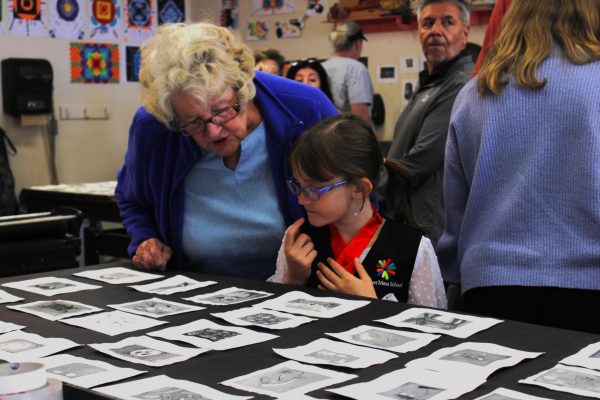Bring Back Senior Humanities?
One Senior Makes the Case
“For more than 60 years, [Albuquerque Academy] has offered an education that broadens perspectives, sharpens minds, strengthens bodies, and engages hearts.” When you visit the Albuquerque Academy website, this is one of the first quotes that greets you. When I, a senior and student at Academy since sixth grade, reflect on my Academy experience, I can agree with this statement. Even so, there are no courses at this school that have broadened my perspective, unlike the Senior Humanities has. Now, the existence of Senior Humanities as a required course and common experience among alumni is threatened by a course change, and, on a wider scale, the changing nature of what is valued in education across the country.
Senior Humanities has been the “capstone” history course at Academy since 1974. It brings together seven years of study in human history and teaches students how to apply this knowledge to the philosophical questions that people have asked since the beginning of time. Along the way, seniors are guided by valuable texts and by their fellow students, learning to engage in thoughtful discussion and hear opinions that aren’t their own.
The course requirement change does two things. First, it reduces the combined English-History graduation requirements from eight years to seven, and second, it cross-lists Humanities with English IV courses, requiring Seniors to take either an English IV class or Humanities. Students can still choose to take both English and Humanities, but the Humanities curriculum will change to accommodate kids who choose Humanities over English. Next year’s Humanities classes will incorporate more close reading and thesis-driven essays, skills normally taught in English. English Department chair Elizabeth Payne said, “we’ll bring the writing requirement more clearly to Humanities…[writing assignments will] be more in frequency and type what those of a standard English class would be.”
Reasons cited for the change include increasing student choice by making room for more electives and reducing stress. “Across the country, there has been a lot of adolescent levels of anxiety and stress that’s very high. We’ve been thinking about ways that we could minimize student stress,” says Associate Head of School Stephanie Lipkowitz. The hope is that students will fill the extra block with an elective they’re interested in and that they will find less stressful. However, in my experience, Humanities is not a high-pressure class. My Humanities class is centered almost entirely on in-class discussion. Homework is usually an assigned reading that is not overwhelming, especially considering the new schedule, which allows two nights to do homework for each class. While the amount of work students have for Humanities depends on their teacher, most of the people I’ve spoken to agree that homework is not overwhelming. “It is probably one of my least stressful classes as far as homework goes,” says Amanda Carey, a senior. Sara Perez ’22 agrees, saying that “it’s definitely a low-stress class for me.” When asked about the requirement change, Lipkowitz said that past students had found “having a very heavy writing and reading course, two of them [English and Senior Humanities], on top of applying to colleges, very stressful.” However, I have found the writing load for Humanities small, especially since most of our writing assignments are done in class. While seeking to reduce stress is a noble effort on behalf of the administration, Academy kids are high-achieving students that put a lot on their plate no matter the requirements, whether that be joining clubs, taking many classes, or applying to lots of colleges. There is no guarantee that taking an elective instead of humanities will change stress levels, and, in the past, I have found my electives strenuous, especially in comparison to Humanities. If the goal is to reduce stress, there are ways to do so while continuing to require Humanities, the curriculum of which can help students cope with the difficult decisions of senior year.
When you think of a philosophy course, you don’t normally think of stress relief. However, the Humanities curriculum at Academy is one that above all teaches students how to design a life that fits them. In the past five months, I have figured out more about myself than during any other time in my life. Through reading and discussing Aristotle’s views on happiness, or Confucius’ idea of a good person, I have reevaluated and defined my own values and what I want in life. Learning about guiding principles and considering which fit you and which don’t, makes difficult choices easier, reducing stress for seniors making big life decisions. Some classes even learn how to practice Zen meditation, cultivating a valuable lifelong skill. Humanities is also a controlled environment where, through discussion, students can develop social skills that are crucial to a life outside of the Academy. We learn and practice polite discussion protocols, such as disagreeing respectfully and inviting others into the conversation, which makes students into adults who can be respectful of their peers in a workplace environment. While I often disagree with my classmates, and I am sure they disagree with me, I never feel attacked for my views, and we all work to be considerate of everyone. Good conduct learned in school can be extended to all aspects of life, and it is what separates Academy graduates from others. There is no other class that teaches this.
While I support trying to give students more choice in what they take, a student’s interest isn’t always the main factor in making course choices. There are many classes I have taken over the years just because colleges want that class on my transcript. Giving seniors another spot in their schedule doesn’t mean they’ll fill it with a class, and it also doesn’t mean they’ll fill it with a class they want. Removing Humanities will not change the fact that it is outside pressure from colleges and parents that leads students to choose classes they aren’t interested in and won’t enjoy. As our world becomes more digital, and STEM subjects are seen as better paths to jobs and money, the humanities are increasingly seen as frivolous at many universities and high schools. Yet, the humanities as a whole teach critical thinking and creativity, highly valued skills in the tech industry. If we remove a life-changing course, no matter how good the intention, there is no guarantee that what replaces it will have the impact that Humanities has had on every Academy student. And, while some don’t enjoy the class, that doesn’t mean that it is not needed. “I definitely am a person who doesn’t love hums and I still think it should be required,” said Gina Kennedy ’22. She added that “if given the option I wouldn’t have taken hums, and that would not have been the right decision.” Those people who might not take Humanities are the ones who need it the most. English and Humanities provide balance to the life of a student that might lean heavily towards science and math. It exercises a different part of the brain at a time when the brain is going through crucial developments. Until a person’s mid-20s, the brain is in the process of removing unused connections in thinking processes. A high school education, then, should have the goal of creating a well-rounded individual. Though I have no love for STEM, I recognize its importance in helping my brain process information, and I know the synapses I develop in these classes will help me in the future. The reason the Humanities course change is concerning is that this course is no longer valued by colleges, and thus will not be taken by high school students. Though there have been reduced requirements for STEM courses at Academy in the last few years, it is not concerning because kids will continue to take science and math, even if they don’t love it. STEM courses will continue to be in high demand as long as colleges value them, which seems to be for the indefinite future.
I would urge our school, then, to reconsider their decision. It is a popular decision, these days, to remove humanities courses. It is an easy option, to go with the flow that is reducing humanities education. But, however good the intention, this decision will have consequences in the future. It will separate the class of 2023, and all classes after it, from the rest of Academy alumni. It will make a course optional that, because of the skills it teaches, has defined our graduates as excellent. There will be students who will not miss it, but they will not know what they are missing. I urge the Academy administration to be stubborn, to lead the way in continuing humanities education, because as Carey said, “no matter where in the world or in what career we end up [pursuing], we are all going to have to be part of the global community. This class teaches us how to do that.” The future students who don’t take Senior Humanities are missing a class that, in Carey’s words, “teaches us about history, morality, and what it ultimately is to be human.” I believe that in a world that increasingly revolves around screens and robots, the next generation of students need some humanity.













Kimberley Rodriguez • Dec 18, 2021 at 7:10 am
Audrey,
Thank you for pointing out the value of our senior humanities course. My son, from the class of 2016, was initially not particularly interested in this course, but I believe it ended up being the most influential class of his Albuquerque Academy experience. He earned his college degree in applied mathematics and quantitative science, but it is the philosophical discussions of senior humanities and his freshman Barrett honors course in the human experience that he misses most now that he is out of school. The ASU Barrett honors college does value the humanities, as do many colleges. My daughter (2013) also loved the senior humanities course. I am glad that this class is still available, and I am hopeful that the vast majority of our students will continue to enroll in it. Mrs. Rodriguez, English 6
Sent from my iPad
Kamila • Dec 17, 2021 at 4:51 pm
I love this Audrey. As a future STEM major, I was absolutely dreading taking humanities, but I am so grateful that I was required to. The course has made me better at writing about, listening to, and interpreting the world; I believe I would not have gotten a complete education without the course. Also, if they are worried about stress they should consider removing the writing aspect from the course and making it entirely in-class discussion/ reading. I feel like that would be an easier solution and everyone would enjoy it.
Michael Anne Sullivan • Dec 17, 2021 at 1:35 pm
Audrey,
This was a wonderfully articulate defense of Senior Humanities. I appreciate your perspective and balanced reporting!
Halie Leland • Dec 17, 2021 at 11:41 am
THANK YOU AUDREY
Anais Garvanian • Dec 17, 2021 at 9:23 am
Audrey, Thank you so much for this thoughtful and thorough piece. I think all of your points are well made and merit consideration. Something I want to highlight that you said is that there is no other class besides Humanities in which students learn to formulate and express their views, disagree respectfully, and “develop social skills” like respect that will serve them in adult life.
If this is true, then I think you have highlighted a massive area of growth for our community. Those are skills that should be developed in every class across the curriculum as they are the basis of a healthy and productive school community. I would be interested in hearing from teachers and students around this point and I am hopeful that your writing will generate discussion not only around Humanities classes but community standards in general.
Kira Small • Dec 17, 2021 at 9:06 am
This is really interesting. I understand admin’s intentions and it’s clear that the decision came out of wanting students to have more choice in their schedules, but at the same time I love how humanities – a class focused on what it means to be good – is a shared, revelatory experience for seniors. In my opinion, its biggest flaw is the lack of in-depth discussion of current events/politics, which could help boost accessibility and engagement were it emphasized more heavily. I agree that it’s a pretty low-pressure class in general, but I can see how people who weren’t interested in philosophy could find it intimidating. My solution would be a required, college-knowledge-esque class that meets less frequently, has less work, and is more focused on politics and empathetic civic engagement, and then offering a philosophy-centric Humanities elective. Anyways, I loved this article and really appreciate how you gave all opinions the weight they deserved while standing firm about your own conclusion.
Casey Citrin • Dec 17, 2021 at 8:18 am
Wow, what a wonderful, well-written, and comprehensive op-ed, Audrey. I really appreciate your and your classmates’ perspectives! Thank you!